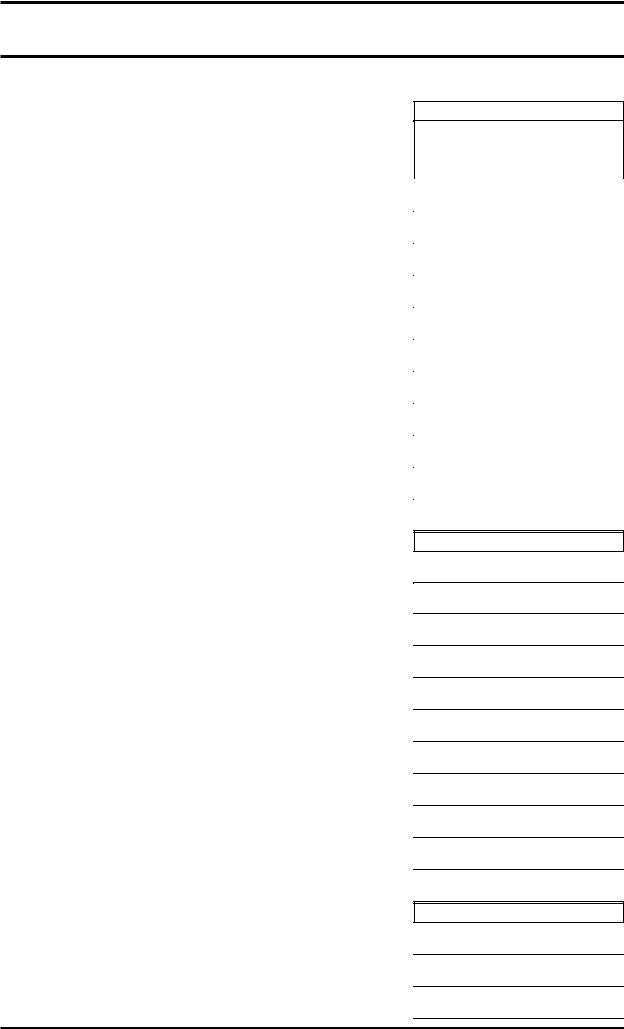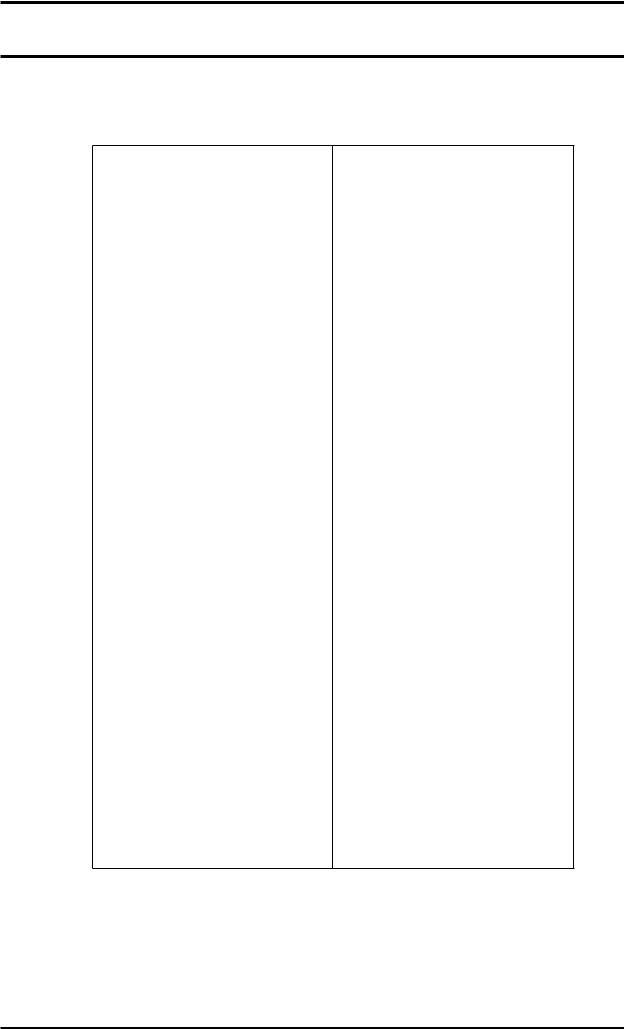
- •Introduction
- •Workbook contents
- •Phrasal verbs
- •Opposites 2
- •Abbreviations
- •Symptoms & common illnesses 1
- •Symptoms & common illnesses 2
- •Diagnosis
- •How it works
- •Instruments and equipment
- •Chemistry
- •Anagrams 1
- •Parts of the body crossword 1
- •Communicative crossword 1 sheet A
- •Communicative crossword 1 sheet B
- •Anagrams 2
- •Word search
- •Communicative crossword 2 sheet A
- •Communicative crossword 2 sheet B
- •Parts of the body crossword 2
- •Gap fill crossword
- •Communicative crossword 3 sheet A
- •Communicative crossword 3 sheet B
- •Quiz
- •Vocabulary Record Sheet
- •Answer key

PhrasalUnit verbs0000
Natural English conversation includes many phrasal verbs. These are verbs made up of two words: a verb and a preposition. For example: 'I get up at eight o'clock'. Complete the sentences below using the phrasal verbs in the box. You will have to change the forms of some of the verbs to make the grammar of the sentence correct. The first one has been done for you as an example.
1. |
He |
|
got over his cold. |
||
|
|
|
|
|
|
2.The nurses are _______________her very well.
3.He must have _______________ the disease when he was travelling in Africa.
4.She often _______________ in front of the TV.
5.When we told her that her father was ill, she
_______________.
6.She _______________ and cried as she described the symptoms to the doctor.
7.He _______________ his father.
8.The doctor asked him to _______________ his shirt.
9.He was _______________ mucus.
10.Since she had the accident she _______________ using crutches.
11.I was advised to _______________ smoking.
12.He was _______________ by a blow to the head.
13.The nurse _______________ the patient with pillows.
14.The swelling has started to _______________.
15.She became worried when the girl started _______________
blood.
Phrasal verbs
break down = to start to cry and become upset
bring up = to cough up material such as mucus from the lungs or throat
cough up = to cough hard to expel a substance from the trachea
drop off = to fall asleep
get around = to move about
get over = to become better after an illness or a shock
give up = not to do something any more
go down = to become smaller
knock out = to hit someone so hard that he or she is no longer conscious
look after = to take care of a person and attend to his or her needs
pass out = to faint
pick up = to catch a disease
prop up = to support a person, e.g. with pillows
take after = to be like one or other parent
take off = to remove something, especially clothes
Extension. Work with a partner: write a dialogue which includes at least seven of the phrasal verbs from this page.
17
For reference see A & C Black Dictionary of Medical Terms (0 7136 7603 5).

Verbs:Unit 0000active/passive
Change the sentences below from active to passive tense. For example:
Active: The GP referred the patient to a consultant.
Passive: The patient was referred to a consultant by the GP.
Remember that it is not always necessary to mention the subject in a passive sentence. For example:
Active: We have identified the cause of this outbreak of dysentery. Passive: The cause of this outbreak of dysentery has been identified.
1.The nurse noticed a rise in the patient's pulse rate. Passive:……………………………………………………………………………………………………
2.The consultant is allowing him to watch the operation. Passive:……………………………………………………………………………………………………
3.All chemists sell the tablets. Passive:……………………………………………………………………………………………………
4.The doctor diagnosed appendicitis. Passive:……………………………………………………………………………………………………
5.The paramedics comforted the injured person until the ambulance arrived. Passive:……………………………………………………………………………………………………
6.The midwife delivered the twins. Passive:……………………………………………………………………………………………………
7.The gland was producing an excess of hormones. Passive:……………………………………………………………………………………………………
8.They looked after him very well in hospital. Passive:……………………………………………………………………………………………………
9.We examined the tissue under the microscope. Passive:……………………………………………………………………………………………………
10.The doctor gave me an unpleasant mixture to drink. Passive:……………………………………………………………………………………………………
11.You cannot take the lotion orally. Passive:……………………………………………………………………………………………………
12.Toxic fumes poisoned the workers. Passive:……………………………………………………………………………………………………
13.Doctors are predicting a rise in cases of whooping cough. Passive:……………………………………………………………………………………………………
14.The drug suppresses the body's natural instinct to reject the transplanted tissue. Passive:……………………………………………………………………………………………………
18
For reference see A & C Black Dictionary of Medical Terms (0 7136 7603 5).

UnitAdverbs0000
The sentences below do not read correctly. Identify the adverbs in the sentences and then swap the adverbs around so that each sentence makes sense.
Some of the adverbs could be used in several of the sentences.
1.The bandage was medicinally tied around her wrist.
……………………………………………………………………………………………………………
2.Immediately, she is very advanced for her age.
……………………………………………………………………………………………………………
3.If the patient sweats fairly, it may be necessary to cool his body with cold compresses.
……………………………………………………………………………………………………………
4.The tumour is excessively placed and not easy to reach.
……………………………………………………………………………………………………………
5.She manages all her patients very mentally.
……………………………………………………………………………………………………………
6.The relief team loosely requires more medical supplies.
……………………………………………………………………………………………………………
7.This is a physically antiseptic solution.
……………………………………………………………………………………………………………
8.Mildly he is very weak, but his mind is still alert.
……………………………………………………………………………………………………………
9.He became ill efficiently after he came back from holiday.
……………………………………………………………………………………………………………
10.The herb can be used awkwardly.
……………………………………………………………………………………………………………
11.He has been working as a doctor only for a severely short time.
……………………………………………………………………………………………………………
12.Her breathing was urgently affected.
……………………………………………………………………………………………………………
19
For reference see A & C Black Dictionary of Medical Terms (0 7136 7603 5).

PrepositionsUnit 0000
The sentences in this exercise contain mistakes. The mistakes are all in the prepositions and there are three types:
1. |
missing preposition |
I spoke ^him about this last week. |
to |
2. |
wrong preposition |
We're meeting again in ^Tuesday. |
on |
3. |
unnecessary preposition |
I'll telephone to you tomorrow. |
|
Find the mistakes and correct them.
1.The hospital has installed new apparatus through the physiotherapy department.
2.Her lips were cracked of the cold.
3.The boy's little toe was crushed the door.
4.The tissue was examined on the microscope.
5.It is important that needles used at injections should be sterilised.
6.He is recovering from a bout flu.
7.She was given to a pain-killing injection.
8.Some types of wool can irritate to the skin.
9.This report quotes the number of cases of cervical cancer from thousand patients tested.
10.The doctor put the patient to sleep within a strong narcotic.
11.She burnt her hand at the hot frying pan.
12.We have no spare beds on the hospital at the moment.
13.He will have an operation to remove of an ingrowing toenail.
14.Please ensure that the patient takes of his medicine.
20
For reference see A & C Black Dictionary of Medical Terms (0 7136 7603 5).

WordUnitstress00001
One of the keys to English pronunciation is stress - emphasis. There are three possible patterns for three-syllable words:
A: |
|
hos-pi-tal |
|
|
1 |
|
B: |
|
pre-scrip-tion |
|
|
|
|
|
|
2 |
|
|||
C: |
|
rec-om-mend |
|
|
||
|
|
|
|
|||
|
|
|
|
|
|
|
|
|
|
3 |
|
||
|
|
|
|
|||
Read these five conversations. Find all the three-syllable words and classify them by their pronunciation. There are 27 in total. Put them in the correct sections of the table on the right. The first one has been done for you as an example.
Dialogue 1
When was she admitted to hospital?At about four o'clock.
Has there been any improvement?
No, her condition is stable. We're waiting to see how things develop.
Dialogue 2
What do you recommend?
Well, first of all: cut down on fatty foods.And what else?
Take regular exercise, don't smoke and keep alcohol down to a minimum.
Dialogue 3
What's the problem?
I went to give him his injection and I saw that he'd started to haemorrhage.
We'll have to operate. Make sure all the equipment is prepared.
I'll go down to the theatre and check.
Dialogue 4
So, is it serious?
Don't worry. It's probably just an allergic reaction.Are you just saying that to reassure me?
You're fine. Look, I'm going to give you a prescription for some painkillers…
Dialogue 5
Have you got the test results yet?
Well, they're still incomplete, but it's clear that it's positive.
Any idea when infection took place?
I'd say five or six weeks ago, but that's just an opinion. Do you want to see her medical history?
Extension. Practise the dialogues with a partner.
21
For reference see A & C Black Dictionary of Medical Terms (0 7136 7603 5).

WordUnit 0000stress 2
One of the keys to English pronunciation is stress - emphasis. There are three normal patterns for four-syllable words:
A: vac-ci-na-ted |
B: pneu-mo-ni-a |
C: in-flu-en-za |
|
|
|
Exercise 1. Complete the sentences below
using the four-syllable words in the table. The first question has been done for you as an example.
1.She appeared to be improving, but a complication set in and she died a few hours later.
2.Bell's Palsy causes facial ______________.
3.Come right now: it's an ______________!
4.The patient was having difficulties breathing so we put him on a ___________.
5.She had an ______________ to replace the cornea.
6.He was given a general _____________ before the surgeons began work.
7.As a precaution against AIDS we use ___________
needles.
8.He can't take aspirin: he has an ______________
to it.
9.Rub your hands together to get the ______________
going.
10.He couldn't ______________ the movements of his arms and legs.
11.An ______________ was organised to test the drug on a small group of people.
12.Tests confirmed the _____________ of the growth.
13.This is the allergen which was _____________ for the patient's reaction.
14.______________ showed that the food contained bacteria.
15.The surgeons are trying to find a ______________ donor.
16.A diet high in _____________ fats increases the risk of heart disease.
17.The surgeon ___________ to the students how to make the incision.
18.As many as 60-70% of diarrhoeal deaths are caused by
______________.
19.Autistic children do not ______________ with anyone.
20._____________ is a common antibiotic produced from a fungus.
22
Exercise 2. Decide which pronunciation pattern is correct for each of the words in the table and tick the appropriate column.
|
|
A |
B |
C |
|
|
|
|
|
|
|
|
|
|
|
anaesthetic |
|
|
|
|
|
|
|
|
|
|
|
|
|
|
analysis |
|
|
|
|
|
|
|
|
|
circulation |
|
|
|
|
|
|
|
|
|
communicate |
|
|
|
|
|
|
|
|
|
compatible |
|
|
|
|
|
|
|
|
|
complication |
|
|
|
|
|
|
|
|
|
coordinate |
|
|
|
|
|
|
|
|
|
dehydration |
|
|
|
|
|
|
|
|
|
demonstrated |
|
|
|
|
|
|
|
|
|
disposable |
|
|
|
|
|
|
|
|
|
emergency |
|
|
|
|
|
|
|
|
|
experiment |
|
|
|
|
|
|
|
|
|
|
|
|
|
|
intolerance |
|
|
|
|
|
|
|
|
|
malignancy |
|
|
|
|
|
|
|
|
|
operation |
|
|
|
|
|
|
|
|
|
paralysis |
|
|
|
|
|
|
|
|
|
penicillin |
|
|
|
|
|
|
|
|
|
respirator |
|
|
|
|
|
|
|
|
|
responsible |
|
|
|
|
|
|
|
|
|
saturated |
|
|
|
|
|
|
|
|
|
|
|
|
|
For reference see A & C Black Dictionary of Medical Terms (0 7136 7603 5).

PresentUnitsimple0000
Verbs in the present tense add an 's' in the third person singular: I work, you work, he/she/it works. But the 's' has three different pronunciations. Look at these examples:
A:/s/, for example treats
B:/z/, for example heals
C:/ z/, for example changes
Find the third person present tense verbs in these sentences and classify them by their pronunciation. Put them in the correct columns in the table on the right. Be careful: some sentences have more than one example. There are 27 verbs in total. The first one has been completed for you as an example.
1.The patient breathes with difficulty and coughs and sneezes constantly.
2.This drug helps to alleviate the symptoms and reduces the risk of reinfection.
3.A person whose resistance is low catches diseases more easily.
4.When someone panics his heart beats more rapidly and his temperature rises.
5.The laboratory analyses the blood samples and then the doctor examines the results and diagnoses the condition.
6.He then recommends a course of treatment and prescribes any necessary drugs.
7.This drug relaxes the muscles and relieves pain.
8.The gland releases hormones into the bloodstream, causing an immediate reaction.
9.If the patient sleeps well, he wakes feeling refreshed.
10.She suffers constant pain and controls it by using morphine.
11.This treatment counteracts the effects of the infection.
12.It is a procedure which cures the condition or kills the patient.
13.If the surgeon operates now the chance of success increases to about 50%.
14.The sinoatrial node regulates the heart beat.
Group A: /s/ 1………………………… 2………………………… 3………………………… 4………………………… 5………………………… 6………………………… 7………………………… 8………………………… 9…………………………
Group B: /z/ 1.…breathes………….
2…………………………
3…………………………
4…………………………
5…………………………
6…………………………
7…………………………
8…………………………
9…………………………
Group C: / z/ 1………………………… 2………………………… 3………………………… 4………………………… 5………………………… 6………………………… 7………………………… 8………………………… 9…………………………
Extension. The same rule applies to plural nouns: /s/ patients, /z/ doctors, / z/ nurses. Work with a partner and find five example nouns for each sound.
23
For reference see A & C Black Dictionary of Medical Terms (0 7136 7603 5).

PastUnit tense0000
Regular verbs have three different pronunciations in the past tense (or the past participle). The difference is in the sound you use for the ending. Look at these examples:
A:/t/, for example placed
B:/d/, for example examined
C:/ d/, for example injected
Find the past tense verbs in these sentences and classify them by their pronunciation. Put them in the correct columns in the table on the right. Be careful: some sentences have more than one verb. There are 23 examples in total. The first one has been done for you as an example.
1.She was vaccinated against smallpox as a child.
2.The doctor diagnosed him as having hepatitis B.
3.Her condition improved, so we reduced the dose.
4.He consulted a specialist, who recommended surgery.
5.The patient coughed and sneezed all through the consultation.
6.The surgeons replaced her hip with a metal one.
7.The doctor prescribed a course of antibiotics.
8.The doctor's speedy action prevented further complications.
9.The pharmacist mixed the chemicals in this bottle.
10.The surgeons operated immediately on the child.
11.He was completely cured.
12.The nurse disinfected and dressed the wound.
13.She was treated by a heart specialist.
14.His pulse rate increased by 10%.
15.The attack was preceded by a rise in body temperature.
16.The surgical instruments were sterilised before use.
17.Nobody noticed that the patient's blood pressure had dropped.
18.The surgeon probed the wound with a scalpel.
Group A: /t/
1…………………………
2…………………………
3…………………………
4…………………………
5…………………………
6…………………………
7…………………………
8…………………………
Group B: /d/
1…………………………
2…………………………
3…………………………
4…………………………
5…………………………
6…………………………
7…………………………
Group C: / d/ 1…vaccinated…..…….
2..................……………
3…………………………
4…………………………
5…………………………
6…………………………
7…………………………
8…………………………
24
For reference see A & C Black Dictionary of Medical Terms (0 7136 7603 5).

GoodUnitadvice0000
These sentences all give very good advice, but they have been divided into separate halves. Match the half-sentences in Column A with the half-sentences in Column B to make 14 sentences which are correct, complete and true.
|
|
Column A |
|
Column B |
|
|
|
|
|
|
1. |
Regular exercise is ... |
a) |
... burn easily in the sun. |
|
2. |
A balanced diet should ... |
b) |
... cause back pain. |
|
|
|
||
|
3. |
Medicines should ... |
c) |
... be inoculated against |
|
|
diphtheria. |
||
|
|
|
|
|
|
4. |
A patient in shock should ... |
d) |
... be kept out of the reach of |
|
|
|
|
children. |
|
5. |
Not taking any exercise is ... |
e) |
... be kept warm and lying |
|
|
|
||
|
|
|
|
down. |
6.Reading in bad light can ...
|
f) |
... about 2.5 litres of fluid each |
7. |
You should do ... |
day. |
|
||
|
g) |
... good for the heart. |
8. |
A normal adult should drink ... |
|
|
h) |
... five minutes' |
9. |
HIV can be transmitted ... |
exercise every morning. |
|
||
10. |
i) |
... be sterilised before use. |
Bad posture can ... |
|
|
|
j) |
... make the eyes ache. |
11.People with fair complexions ...
|
|
k) |
... provide all the nutrients |
12. |
Surgical instruments must ... |
|
needed, in the correct |
|
|
|
proportions. |
13. |
Babies should ... |
l) |
... an unhealthy way of living. |
|
|
||
|
|
m) |
... be by pressure and |
|
|
|
elevation. |
14.Haemorrhage control routinely
should ... |
n) |
... by using non-sterile needles. |
Extension. Working with a partner, write five pieces of medical advice.
25
For reference see A & C Black Dictionary of Medical Terms (0 7136 7603 5).

MultipleUnit 0000meanings
Some words have more than one meaning. For example, the word pulse means the pressure wave in an artery when the heart beats, but it also refers to a certain type of vegetable: beans and peas. In the table below 19 meanings appear in the column on the left. Match each meaning to one of the seven words across the top. The first one has been done for you as an example.
|
|
|
|
|
|
|
|
|
|
|
cold |
fit |
focus |
light |
notice |
patient |
turn |
|
|
|
|
|
|
|
|
|
1. |
A person who is in hospital or who is |
|
|
|
|
|
|
|
|
being treated by a doctor. |
|
|
|
|
|
|
|
|
|
|
|
|
|
|
|
|
2. |
To attach an appliance correctly. |
|
|
|
|
|
|
|
|
|
|
|
|
|
|
|
|
3. |
The point where light rays converge |
|
|
|
|
|
|
|
|
through a lens. |
|
|
|
|
|
|
|
4. |
To see or be aware of something. |
|
|
|
|
|
|
|
|
|
|
|
|
|
|
|
|
5. |
To change into something different. |
|
|
|
|
|
|
|
|
|
|
|
|
|
|
|
|
6. |
Weighing a comparatively small amount. |
|
|
|
|
|
|
|
|
|
|
|
|
|
|
|
|
7. |
An illness, with inflammation of the nasal |
|
|
|
|
|
|
|
|
passages, in which someone sneezes and |
|
|
|
|
|
|
|
|
coughs and has a blocked and running |
|
|
|
|
|
|
|
|
nose. |
|
|
|
|
|
|
|
|
|
|
|
|
|
|
|
|
8. |
The centre of an infection. |
|
|
|
|
|
|
|
|
|
|
|
|
|
|
|
|
9. |
To move the head or body to face in |
|
|
|
|
|
|
|
|
another direction. |
|
|
|
|
|
|
|
|
|
|
|
|
|
|
|
|
10. |
Being able to wait a long time without |
|
|
|
|
|
|
|
|
getting annoyed. |
|
|
|
|
|
|
|
|
|
|
|
|
|
|
|
|
11. |
A piece of writing giving information, |
|
|
|
|
|
|
|
|
usually put in a place where everyone |
|
|
|
|
|
|
|
|
can see it. |
|
|
|
|
|
|
|
12. |
To have convulsions. |
|
|
|
|
|
|
|
|
|
|
|
|
|
|
|
|
13. |
A slight illness or attack of dizziness. |
|
|
|
|
|
|
|
|
|
|
|
|
|
|
|
|
14. |
A sudden attack of a disorder, especially |
|
|
|
|
|
|
|
|
convulsions and epilepsy. |
|
|
|
|
|
|
|
|
|
|
|
|
|
|
|
|
15. |
The energy that makes things bright and |
|
|
|
|
|
|
|
|
helps a person to see. |
|
|
|
|
|
|
|
|
|
|
|
|
|
|
|
|
16. |
To adjust a lens until an image is clear |
|
|
|
|
|
|
|
|
and sharp. |
|
|
|
|
|
|
|
|
|
|
|
|
|
|
|
|
17. |
Strong and physically healthy. |
|
|
|
|
|
|
|
|
|
|
|
|
|
|
|
|
18. |
Not warm or hot. |
|
|
|
|
|
|
|
|
|
|
|
|
|
|
|
|
19. |
Referring to hair or skin which is very |
|
|
|
|
|
|
|
|
pale. |
|
|
|
|
|
|
|
|
|
|
|
|
|
|
|
|
26
For reference see A & C Black Dictionary of Medical Terms (0 7136 7603 5).

OddUnitone0000out
In each set of words one is the odd one out: different from the others. Find the word that is different, and circle it.
For example:
callosum.................... |
cerebellum................... |
colliculus.................... |
coccyx.......................... |
Coccyx is the odd one out. It is a bone; the others are all parts of the brain.
1. |
.....................aching |
..................bleeding |
...................nagging |
................throbbing |
|
|
|
|
|
2. |
hand....................... |
kidney..................... |
leg........................... |
liver......................... |
|
|
|
|
|
3. |
ankle....................... |
elbow..................... |
knee........................ |
forearm................... |
|
|
|
|
|
4. |
ear.......................... |
eye......................... |
face......................... |
nose........................ |
|
|
|
|
|
5. |
nurse....................... |
orderly..................... |
surgeon................... |
patient.................... |
|
|
|
|
|
6. |
bandage.................. |
forceps.................... |
probe...................... |
scalpel..................... |
|
|
|
|
|
7. |
expiration................ |
inspiration............... |
respiration............... |
supination............... |
|
|
|
|
|
8. |
cataracts.................. |
eyelids..................... |
nearsightedness....... |
strabismus............... |
|
|
|
|
|
9. |
improve................... |
get better................ |
recover.................... |
relapse.................... |
|
|
|
|
|
10. |
iris........................... |
lens......................... |
palm........................ |
pupil........................ |
|
|
|
|
|
11. |
oval window............ |
semicircular canals... |
tympanic membrane |
vertebral column..... |
|
|
|
|
|
12. |
aluminium............... |
copper.................... |
iron......................... |
zinc......................... |
|
|
|
|
|
13. |
break....................... |
crack....................... |
fracture................... |
wound.................... |
|
|
|
|
|
14. |
metacarpal bone..... |
nasal bone............... |
occipital bone.......... |
zygomatic arch........ |
|
|
|
|
|
15. |
liver......................... |
heart....................... |
pancreas.................. |
spleen..................... |
|
|
|
|
|
16. |
bite......................... |
chew....................... |
swallow................... |
taste........................ |
|
|
|
|
|
17. |
hepatalgia……..….. |
hernia……………… |
liver………………. |
hepatocyte……..…. |
|
|
|
|
|
18. |
epidermis………….. |
pore……………….. |
dermis………..…… |
diabetes……..…… |
|
|
|
|
|
27
For reference see A & C Black Dictionary of Medical Terms (0 7136 7603 5).

BodyUnit 0000parts - categories
In this table there are 38 words for parts of the body and six categories. Decide which category or categories each part belongs to. The first one has been done for you as an example.
|
|
|
arm |
hand |
leg |
foot |
torso |
head |
|
|
|
|
|
|
|
|
|
|
|
|
|
|
|
abdomen |
|
|
|
|
x |
|
|
|
|
|
Achilles tendon |
|
|
|
|
|
|
|
|
|
|
|
|
|
|
|
|
|
|
|
|
|
ankle |
|
|
|
|
|
|
|
|
|
|
buttock |
|
|
|
|
|
|
|
|
|
|
|
|
|
|
|
|
|
|
|
|
|
calf |
|
|
|
|
|
|
|
|
|
|
chest |
|
|
|
|
|
|
|
|
|
|
|
|
|
|
|
|
|
|
|
|
|
chin |
|
|
|
|
|
|
|
|
|
|
ear |
|
|
|
|
|
|
|
|
|
|
|
|
|
|
|
|
|
|
|
|
|
elbow |
|
|
|
|
|
|
|
|
|
|
|
|
|
|
|
|
|
|
|
|
|
eye |
|
|
|
|
|
|
|
|
|
|
|
|
|
|
|
|
|
|
|
|
|
eyebrow |
|
|
|
|
|
|
|
|
|
|
eyelash |
|
|
|
|
|
|
|
|
|
|
|
|
|
|
|
|
|
|
|
|
|
eyelid |
|
|
|
|
|
|
|
|
|
|
finger |
|
|
|
|
|
|
|
|
|
|
|
|
|
|
|
|
|
|
|
|
|
forearm |
|
|
|
|
|
|
|
|
|
|
|
|
|
|
|
|
|
|
|
|
|
forehead |
|
|
|
|
|
|
|
|
|
|
|
|
|
|
|
|
|
|
|
|
|
gum |
|
|
|
|
|
|
|
|
|
|
hip |
|
|
|
|
|
|
|
|
|
|
|
|
|
|
|
|
|
|
|
|
|
knee |
|
|
|
|
|
|
|
|
|
|
knuckle |
|
|
|
|
|
|
|
|
|
|
|
|
|
|
|
|
|
|
|
|
|
lip |
|
|
|
|
|
|
|
|
|
|
nail |
|
|
|
|
|
|
|
|
|
|
|
|
|
|
|
|
|
|
|
|
|
navel |
|
|
|
|
|
|
|
|
|
|
neck |
|
|
|
|
|
|
|
|
|
|
|
|
|
|
|
|
|
|
|
|
|
nipple |
|
|
|
|
|
|
|
|
|
|
nose |
|
|
|
|
|
|
|
|
|
|
|
|
|
|
|
|
|
|
|
|
|
palm |
|
|
|
|
|
|
|
|
|
|
rib |
|
|
|
|
|
|
|
|
|
|
|
|
|
|
|
|
|
|
|
|
|
scalp |
|
|
|
|
|
|
|
|
|
|
|
|
|
|
|
|
|
|
|
|
|
shoulder |
|
|
|
|
|
|
|
|
|
|
|
|
|
|
|
|
|
|
|
|
|
sole |
|
|
|
|
|
|
|
|
|
|
temple |
|
|
|
|
|
|
|
|
|
|
|
|
|
|
|
|
|
|
|
|
|
thigh |
|
|
|
|
|
|
|
|
|
|
thumb |
|
|
|
|
|
|
|
|
|
|
|
|
|
|
|
|
|
|
|
|
|
toe |
|
|
|
|
|
|
|
|
|
|
|
|
|
|
|
|
|
|
|
|
|
tongue |
|
|
|
|
|
|
|
|
|
|
|
|
|
|
|
|
|
|
|
|
|
tooth |
|
|
|
|
|
|
|
|
|
|
|
|
|
|
|
|
|
|
|
28 |
|
wrist |
|
|
|
|
|
|
|
|
|
|
|
|
|
|
|
|
|
|
|
|
|
|
|
|
|
|
|
|
|
|
For reference see A & C Black Dictionary of Medical Terms (0 7136 7603 5).
